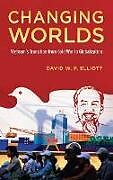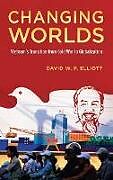Changing Worlds
Einband:
Fester Einband
EAN:
9780195383348
Untertitel:
Vietnam's Transition from Cold War to Globalization
Genre:
Geschichte
Autor:
Elliott David W.P.
Herausgeber:
Oxford University Press
Erscheinungsdatum:
11.10.2012
ISBN:
978-0-19-538334-8
Throughout the entire Cold War era, Vietnam served as a grim symbol of the ideological polarity that permeated international politics. But when the Cold War ended in 1989, Vietnam faced the difficult task of adjusting to a new world without the benefactors it had come to rely on. In Changing Worlds, David W. P. Elliott, who has spent the past half century studying modern Vietnam, chronicles the evolution of the Vietnamese state from the end of the Cold War to the present. When the communist regimes of Eastern Europe collapsed, so did Vietnam's model for analyzing and engaging with the outside world. Fearing that committing fully to globalization would lead to the collapse of its own system, the Vietnamese political elite at first resisted extensive engagement with the larger international community. Over the next decade, though, China's rapid economic growth and the success of the Asian "tiger economies," along with a complex realignment of regional and global international relations reshaped Vietnamese leaders' views. In 1995 Vietnam joined the Association of Southeast Asian Nations (ASEAN), its former adversary, and completed the normalization of relations with the United States. By 2000, Vietnam had "taken the plunge" and opted for greater participation in the global economic system. Vietnam finally joined the World Trade Organization in 2006. Elliott contends that Vietnam's political elite ultimately concluded that if the conservatives who opposed opening up to the outside world had triumphed, Vietnam would have been condemned to a permanent state of underdevelopment. Partial reform starting in the mid-1980s produced some success, but eventually the reformers' argument that Vietnam's economic potential could not be fully exploited in a highly competitive world unless it opted for deep integration into the rapidly globalizing world economy prevailed. Remarkably, deep integration occurred without Vietnam losing its unique political identity. It remains an authoritarian state, but offers far more breathing space to its citizens than in the pre-reform era. Far from being absorbed into a Western-inspired development model, globalization has reinforced Vietnam's distinctive identity rather than eradicating it. The market economy led to a revival of localism and familism which has challenged the capacity of the state to impose its preferences and maintain the wartime narrative of monolithic unity. Although it would be premature to talk of a genuine civil society, today's Vietnam is an increasingly pluralistic community. Drawing from a vast body of Vietnamese language sources, Changing Worlds is the definitive account of how this highly vulnerable Communist state remade itself amidst the challenges of the post-Cold War era....
Changing Worlds is a valuable contribution to the field of Vietnam studies. What distinguishes it from many geo-economic and geopolitical narratives on Vietnam, is that this book provides readers with an alternative, context-sensitive explanation for the shift of the collective mind-set of the Vietnam elite. This book should be read by all scholars and students of Vietnam studies and international studies.
Autorentext
David W. P. Elliott is H. Russell Smith Professor of Government and International Relations at Pomona College. Upon completion of a year of Vietnamese language training at the Defense Language Institute, Elliott served with the U.S. Army in Vietnam from 1963-65. In 1965, he joined the Rand Corporation, and supervised part of its "Viet Cong Motivation and Morale Study" in Dinh Tuong province in the Mekong Delta until the end of 1967. During the course of graduate study at Cornell University, he returned to Vietnam to do research in 1971-72 and has returned to Vietnam nine times in the post 1975 period to do research, attend conferences, and participate in educational exchanges. Elliott was a participant in the U.S.-Vietnam Dialogue sponsored by the Aspen Institute and organized by former Senator Dick Clark in the 1980s and early 1990s and accompanied Senator Clark to Vietnam in 1991 for meetings with leading Vietnamese figures.
Klappentext
For the most of the twentieth century, the country of Vietnam served as a symbol of the bipolar system of rival ideological blocs that characterized the Cold War. As the conflict over communism waned in the 1980s, Vietnam faced the tough task of remaking itself as nation in the eyes of its people and of the world. In Changing Worlds, David W.P. Elliot, a participant in the Aspen Institute's U.S.-Vietnam Dialogue who has spent the past forty years working closely with the people and government of Vietnam, chronicles the evolution of the Vietnamese state as we know it today.
Zusammenfassung
For the most of the twentieth century, the country of Vietnam has served as a symbol of the bipolar system of rival ideological blocs that characterized the Cold War. As the conflict over communism waned in the 1980s, Vietnam faced the tough task of remaking itself as nation in the eyes of its people and of the world. In Changing Worlds, David W.P. Elliot, a participant in the Aspen Institute's U.S.-Vietnam Dialogue who has spent the past forty years working closely with the people and government of Vietnam, chronicles the evolution of the Vietnamese state as we know it today. With the collapse of communist regimes in Europe, Vietnam witnessed the dissolution of the cornerstone of its policies toward the outside world. Fearing that a full commitment to deep integration in a globalizing world would lead to the collapse of their own current political system, the Vietnamese political elite made slow, cautious steps to involvement with the larger international community. By the year 2000, however, Vietnam had "taken the plunge" and opted for greater participation in the global economic system, leading to its membership in the World Trade Organization in 2006. Elliott illustrates that the politicians who took a limited approach to international involvement ultimately had condemned Vietnam to a permanent state of underdevelopment. It is only at the turn of the 21st century when the Vietnamese state began to relax its policies toward the international community that the nation began to experience a period of revitalization. Remarkably, these changes have happened without Vietnam losing its unique political identity as many had expected. It remains an authoritarian state, but offers far more breathing space to its citizens than in pre-reform era. Far from leading the nation to be absorbed into a Western-inspired development model, globalization has led to a complex domestic diversification and localization that has reinforced Vietnam's distinctive identity rather than obliterating it. The culmination of decades of research and cultural exchange, Changing Worlds documents the unique story of the birth of a nation amidst the challenges of the post-Cold War era.
Inhalt
PREFACE; CHAPTER ONE: INTRODUCTION; CHAPTER TWO: ON THE EVE OF DOI MOI REFORM (1975-1986); CHAPTER THREE: THE YEAR OF LIVING DANGEROUSLY (1989); CHAPTER FOUR: CHANGING PARTNERS IN A CHANGING WORLD (1990-1991); CHAPTER FIVE: WAY RECONCILIATION (1992-1995); CHAPTER SIX: UNCERTAIN TRANSITION; CHAPTER SEVEN: TAKING THE PLUNGE; CHAPTER EIGHT: A STRATEGY FOR THE 21ST CENTURY; CHAPTER NINE: RHETORIC AND REALITY

Leider konnten wir für diesen Artikel keine Preise ermitteln ...
billigbuch.ch sucht jetzt für Sie die besten Angebote ...
Die aktuellen Verkaufspreise von 6 Onlineshops werden in Realtime abgefragt.
Sie können das gewünschte Produkt anschliessend direkt beim Anbieter Ihrer Wahl bestellen.
Loading...
Die aktuellen Verkaufspreise von 6 Onlineshops werden in Realtime abgefragt.
Sie können das gewünschte Produkt anschliessend direkt beim Anbieter Ihrer Wahl bestellen.
| # | Onlineshop | Preis CHF | Versand CHF | Total CHF | ||
|---|---|---|---|---|---|---|
| 1 | Seller | 0.00 | 0.00 | 0.00 |
